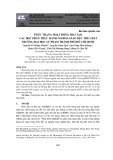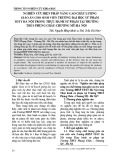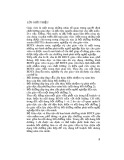
VNU Journal of Science: Education Research, Vol. 41, No. 1 (2025) 62-73
62
Original Article
A Quantitative Survey on Students Majoring in Preschool
Education to Build Vocational Practice Program
Ho Thi Tuong Van1,*, Pham Phuoc Manh2
1National College of Education Ho Chi Minh, Nguyen Chi Thanh, District 10, Ho Chi Minh, Vietnam
2University of Pedagogy Ho Chi Minh, An Duong Vuong, District 5, Ho Chi Minh, Vietnam
Received 06th November 2024
Revised 30th December 2024; Accepted 30th December 2024
Abstract: In order to build a vocational practice program for students majoring in preschool
education at the college level according to the connection model between pedagogical schools
(colleges of preschool education) and kindergartens (preschools), the authors have the study in 2
years (from 2023 to 2024) based on previous studies by many different authors and the authors
ourselves. The surveys in the plan of the study obtained positive results but did not clearly
demonstrate the diversity ideas of many subjects nor did it specifically supplement the content, the
subjects of the on-going building vocational practice program. Therefore, the study should be
conducted one more quantitative survey on students to the original plan in order to expand
diversity and express the wishes of learners while carrying out the vocational practice program.
The results of this survey on students are also hoped by the authors to add some specific content
and subjects in the process of building a vocational practice program.
Keywords: Vocational practice program, connection model, participatory approach, students
majoring in preschool education.
1. Introduction *
The survey and interview results at the 2nd
stage (end of the year 2023) of the project
"Building a vocational practice program for
students majoring in preschool education at
college level according to the connection model
between pedagogical schools and preschools" -
end of year 2023 from the management staff
_______
* Corresponding author.
E-mail address: hothituongvan@gmail.com
https://doi.org/10.25073/2588-1159/vnuer.5229
and lecturers of the pedagogical schools, the
board of directors and preschool teachers guide
the internship, representatives of the
Department of Education and Training have
gradually formed an overall orientation picture
to build a vocational practice program for
students majoring in preschool education at the
college level according to the model of
connection between pedagogical schools and
preschools. However, the overall orientation
picture largely focuses on connection methods,
connection models, current situation and

H. T. T. Van, P. P. Manh / VNU Journal of Science: Education Research, Vol. 41, No. 1 (2025) 62-73
63
proposed policies for better organization and
coordination between pedagogical schools and
preschools. Meanwhile, the results obtained the
overview program and specific content of the
vocational practice program all range from
agree to strongly agree, as well as not
demonstrate the urgency of building a
vocational practice program according to the
connection model between pedagogical schools
and preschools - the initial hypothesis of the
project/the study. Therefore, the author decided
to conduct an additional surveys (beyond the
original plan) on learners - students majoring in
preschool education at college level - subjects
who are less affected by the organizational
process or management process but who
participate in implementing to meet the content,
subjects, goals, requirements, products, etc.
from the vocational practice program. From
there, the author expects survey results from
students majoring in preschool education at the
college level will provide more concrete
evidence of the urgency of building and
adjusting a vocational practice program before
entering the 3rd stage - the proposing a
vocational practice program according to the
connection model between pedagogical schools
and preschools. The information from the
survey results below will contribute to orienting
adjustments and building vocational practice
programs that closely meet learner’/subjects’
needs and social needs better, suggesting an
appropriate approach - participatory approach.
This article will be briefly presented the
main theories related to the study and survey
content, thereby describing the questions,
the purpose of survey and the results from
students majoring in preschool education at the
college level.
2. Literature Review
2.1. Definition of Vocational Practice Program
in Preschool Education
From many different perspectives and
definitions about “the program” (Irma., 2007,
pp. 275), the program can be defined as a
comprehensive plan for selecting content and
organizing learning experiences that consider
all philosophical factors, social and
administrative factors contribute to the aim of
changing and developing learners' behavior and
understanding. The program typically includes
purpose, content, methods, assessment and the
process by which the program is developed,
implemented and evaluated.
In the training program for a specific major,
the structure is designed to include theory and
practice to meet the needs of equipping the
profession with appropriate knowledge, skills,
and attitudes towards social needs. Practice and
internship are a mandatory period of vocational
training for students in some training majors.
For the pedagogy field, vocational practice and
pedagogical internship are the practical stages
that synthesize vocational knowledge to form
abilities for future teacher’s tasks. Vocational
practice activities have a clear purpose to practice
therefore improving pedagogical capacity and
forming necessary personality qualities for
pedagogical students through interacting and
working at a specific school, contributing to
training future teachers that meet the requirements
of society and employers.
The vocational practice program for
students majoring in preschool education at the
college level is a practice plan linked to the
profession with a comprehensive purpose,
content, method, organization, coordination and
evaluation methods to change and develop the
vocational knowledge, skills and competencies
for students majoring in preschool education.
The vocational practice program for students
majoring in preschool education at the college
level is an opportunity to help students perform
the pedagogical activities of a teacher, practice
therefore improving pedagogical capacity and
forming necessary personality qualities for
pedagogical students through interacting and
working at a specific preschool, contributing to
training future preschool teachers that meet the

H. T. T. Van, P. P. Manh / VNU Journal of Science: Education Research, Vol. 41, No. 1 (2025) 62-73
64
requirements of society and employers (Ho.,
2023, ongoing research project).
2.2. The Connection Model between
Pedagogical Schools and Preschools
From the “model” definition (Institute of
Linguistics (2003), pp. 634.) and “connection”
definition (N. Nhu Y (1998)), the author
summarizes the definition of "the connection
model between pedagogical schools and
preschools" as follows: The connection model
between pedagogical schools (colleges of
preschool education) and preschools is the
result of one or a set of principles and theories
stemming from scientific achievements created
over a period of time, as a result of searching
for solutions and are condensed for easy
understanding and implementation to solve
specific problems or situations that arise in the
process of coopepercentagen and attachment
between pedagogical schools and preschools for
some common purpose in education.
Van., 2022, has built two (02) connection
models between pedagogical schools and
preschools, specifically:
Mixed model: is a connection model being
implemented in pedagogical schools, connected
with different types of preschools, through the
coordination of local Departments -
Departments of Education and Training or
contact directly from the pedagogical schools or
students depending on the feature of the
internships.
Supplemental model: is a connection model
applied in specific situations when students
have to re-intern or practice additionally for
unavoidable situations that have been verified
and have a decision to re-intern. At this time,
the pedagogical school chooses to use a
supplemental model in the case of small groups
or a few of students in group contacting
themselves by direct way to increase initiative’
student and catch up with the progress”.
David Clarke and Hilary Hollingsworth
(2002) presented a model of teacher
professional growth. A key feature of the model
is its inclusion of four analytic domains in close
correspondence to those employed identifies the
specific mechanisms by which change in one
domain is associated with change in another.
The interconnected, non-linear structure of the
model enabled the identification of particular
“change sequences” and “growth networks”,
giving recognition to the idiosyncratic and
individual nature of teacher professional
growth. One major value of a change model
grounded in empirical data lies in its capacity to
stimulate speculation, research and
development regarding possible change
mechanisms as yet unexplored and unexploited.
In its current form, this model offers a powerful
framework to support the analyses of those
studying teacher change (or growth) and the
planning of those responsible for teacher
professional development.
The training process of future preschool
teachers from pedagogical schools can apply
this model to orient the impact domain leading
to changes and development of students during
the training process, including the
implementation of the training program at
pedagogical schools and the vocational practice
program at preschools.
Accordingly, if the personal domain plays
an important role in the development of
teachers' careers, the practice domain, the
external domain, plays an important role,
affecting the career development process of
students - future teachers. At the same time,
students - those who are "learning" the
profession, are subject to the regulations of the
training program, the vocational practice
program of the pedagogical school. Therefore,
the organization of vocational practice program
plays an important role, often chosen to be the
first to improve in order to improve the quality
of professional training for students.
2.3. Participatory Approach
In order to propose directions for adjusting
and building a vocational practice program that
closely meets the needs of learners and social
needs better, suggesting an appropriate
approach, the author of the article describes

H. T. T. Van, P. P. Manh / VNU Journal of Science: Education Research, Vol. 41, No. 1 (2025) 62-73
65
some content related to the participatory
approach at this theoretical basic.
In the document of the United Nations
Educational, Scientific and Cultural
Organization (UNESCO), the 2005 report from
Peter Taylor's 2004 article states:
“As with all development processes, power
relations have an enormous impact on
curriculum development, which may be
dominated by one group or individual,
particularly where curriculum development is
centralised, for example in many primary
education systems. In recognition of the varying
importance and influence of different
stakeholders in the curriculum development
process, more and more education and training
institutions around the world are encouraging
participatory curriculum development (PCD)
processes, and at the same time building
functional linkages with their local
communities. PCD approaches create working
partnerships between teachers, learners and
other stakeholders, and aim to increase
ownership of the full learning process, thus
improving the potential for effective learning
through participation.”
Vu Dung, Psychology Dictionary (2012)
defines: “Participation is participating in a certain
activity; attending with someone in some
activities that influences each other”. Stakeholder
engagement can occur throughout the entire
educational program development process,
including planning, delivery and evaluation.
It can be understood, from a more general
perspective, that the participatory approach
creates collaborative working between schools,
learners and other stakeholders, with the aim of
enhancing ownership of the entire learning
process, thereby improving the potential for
more effective learning through stakeholder
engagement.
Pedagogical schools use a participatory
approach (pedagogical schools - preschools -
students - educational experts/representatives of
the Department of Education and Training -
community) in building vocational practice
programs for students majoring in preschool
education at the college level, on the one hand,
to promote the socialization of education, and
on the other hand, to bring the best benefits to
the development of the vocational training
process, learners and local - regional
characteristics, aiming to develop and improve
the training quality of pedagogical schools.
2.4. Building a Vocational Practice Program in
Preschool Education According to the
Connection Model between Pedagogical
Schools and Preschools
Building a vocational practice program for
students majoring in preschool education at the
college level according to the connection model
between pedagogical schools and preschools is
understood as creating, developing and
perfecting a vocational practice program for
students majoring in early childhood education
at the college level. The program is a practice
plan associated with the profession of preschool
teacher, with a comprehensive purpose, content,
method, form of organization, form of
coordination and evaluation for the purpose of
change and develop relevant vocational
knowledge, skills and vocational competencies for
learners (Van, 2023, ongoing research project).
From above definition, a new understanding
“Building a vocational practice program for
students majoring in preschool education at
college level according to the connection model
between pedagogical schools and preschools
focusing on participatory approach” is
understood as creating, developing and
perfecting a vocational practice program for
students majoring in early childhood education
at the college level. The program is a practice
plan associated with the profession of preschool
teacher, with a comprehensive purpose, content,
method, form of organization, form of
coordination and evaluation for the purpose of
change and develop relevant vocational
knowledge, skills and vocational competencies
for learners with the participation of lecturers,
experts, and managers in pedagogical schools -
preschools - students - education experts/
representatives of the Department of Education

H. T. T. Van, P. P. Manh / VNU Journal of Science: Education Research, Vol. 41, No. 1 (2025) 62-73
66
and Training - community to create the best
benefits to the development of the vocational
training process, learners and local - regional
characteristics, aiming to develop and improve
the training quality of pedagogical schools.
2.4.1. Basis for Building a Vocational
Practice Program in Preschool Education
The Decisions and Circulars were issued by
the Minister of Education and Training related
to vocational practive program to colleges
training preschool teachers, standards for
preschool teachers, guilding the usage of
vocational standards for preschool teachers,…
have the basic for colleges building a vocational
practice program for students students majoring
in preschool education.
Futhermore, the authors need to base on the
practical basis of the connection model between
pedagogical schools and preschools; the
essence of building a vocational practice
program for students majoring in preschool
education at the college level to be adapted to
different connection models that are managed,
organized and carried out by many individuals
and organizations; the vocational practice
programs for students majoring in preschool
education are required to have some
adjustments so that they could be transformed
and responded flexibility to the new era.
2.4.2. Participatory Approach in Building a
Vocational Practice Program in Preschool
Education
Participatory approach is aimed at using the
role, form and level of participation of relevant
stakeholders in building a vocational practice
program for students majoring in preschool
education at the college level, including
collective of lecturers, experts, managers in
pedagogical schools - preschools - students -
educational experts/representatives of the
Department of Education and Training -
community, in order to create the best benefits
to the development of the vocational training
process, learners and local - regional
characteristics, aiming to develop and improve
the training quality of pedagogical schools.
Based on theories and reality, we can
summarize the figure below.
Figure 1. Connection model in building vocational
practice program based on participatory approach.
3. Methodology
To survey the current status of the
vocational practice program for students
majoring in preschool education at the college
level according to the connection model
between pedagogical schools and preschools,
we used the questionnaire - survey method
combined with in-depth interviews with
subjects - at the 2nd stage of the project. The
survey was designed in the form of close-ended
questions combined with open-ended questions
to find out the awareness of managers and
lecturers of the pedagogical schools; managers
and internship guidance teachers of the
preschools on the vocational practice program
for students majoring in preschool education at
the college level according to the connection
model between pedagogical schools and
preschools as well as the advantages and
disadvantages in implementing a vocational
practice program for students majoring in
preschool education at the college level
according to the connection model between
pedagogical schools and preschools.
However, as mentioned in the Introduction,
the results related to the program and the
specific content of the vocational practice
program all range from agree to strongly agree
and are not many proposals for building a new
program, nor have they shown the urgency of

![Sổ tay Hướng dẫn viết báo cáo [chuẩn nhất]](https://cdn.tailieu.vn/images/document/thumbnail/2025/20250604/tuongthanhduat/135x160/37781749029736.jpg)


![Sổ tay hướng dẫn xây dựng, phát triển môi trường học và sử dụng ngoại ngữ trong các trường trung học cơ sở [Chuẩn nhất]](https://cdn.tailieu.vn/images/document/thumbnail/2023/20230316/bapluoc06/135x160/1351678957959.jpg)





















